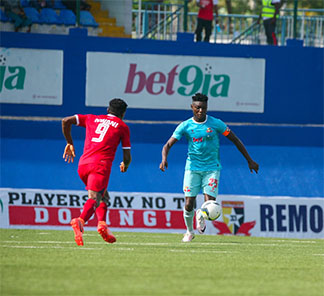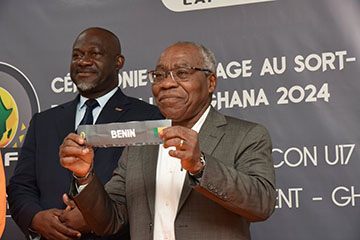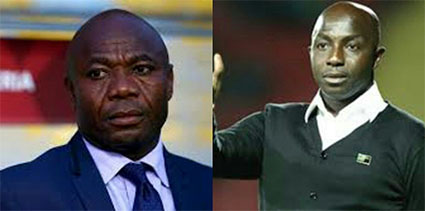Nigerian Football
Strange, But True: The Nigerian Football July Death Anniversaries
BY KUNLE SOLAJA
Sadly, the month of July has virtually become that of memorials for football icons in Nigeria. This may sound strange, but it is true.
Sports Village Square recalls that three days ago, it was the death anniversary of Jelisavicic Tihomer-Tiko, fondly called ‘Father Tiko’.
‘Father Tiko’ – July 1

The younger folks may not remember the then Yugoslavian man (his country is now Serbia) who raised to stardom an army of relatively unknown players who took the 10th edition of Africa Cup of Nations by storm, becoming the second runners-up in Ethiopia in March 1976.
He repeated the feat at Ghana 1978 when Nigeria ranked third in Africa’s premier football competition. He was at the brink of qualifying Nigeria for Argentina 1978 World Cup before the team failed the last hurdle at home. No thanks to an own goal.
Under him, the Nigeria national team played 45 matches, winning 24, drawing 12 and lost nine. He died on July 1, 1986, in Cancum, Mexico. That was two days after the World Cup in that country. He was heading to Cancum to begin a new life as a coach to the local team when an automobile accident claimed his life.
Samuel Ojebode – July 4

Today, July 4, is the death anniversary of one of his players, Samuel Ojebode who passed on five years ago. Ojebode, a left fullback was also a captain of the then IICC Shooting Stars which he later coached and managed as an administrator.
With his death in 2012, the entire back four of the 1976 history-making IICC Shooting Stars have all passed on – Best Ogedegbe, Joe Appiah, Ojebode and Muda Lawal.
Added to that list are Awesu and Folorunsho Gambari aka ‘Gambus’ who died on April 15, 1981.
Kunle Awesu – July 5

Back to the July death anniversaries, yet another product of Father Tiko’s Nigerian team was Kunle Awesu, a left winger with the IICC Shooting Stars who was rated as the best at the 10th Africa Cup of Nations at Ethiopia in 1976.
He was a member of the Shooting Stars team that won the African Winners Cup in 1976.
He died on July 5, 1994 in Arlington, United States on the same day Nigeria crashed out of the USA ’94 World Cup. Sadly for over two years, Awesu’s death was unknown to his Nigerian family members who had lost touch with him.
Muda Lawal and Dan Anyiam – July 6


Next comes that of Muda Lawal, like Ojebode and Awesu, he was in the Father Tiko’s Nigerian team and also a member of the victorious IICC side on the continent.
He died on July 6, 1991, the 14th anniversary of the mysterious death of one of Nigerian national team pioneers, Dan Anyiam who was also the first indigenous national team coach.
Bashorun MKO Abiola – July 7

Who will forget the Bashorun MKO Abiola who pumped much money to football and other sports? He died on July 7, 1998. Another football icon that shared the date with him is Father Dennis Slattery who died in his native country, Ireland on July 7, 2003.
Father Dennis Slattery – July 7

Slattery who lived the greater part of his life in Nigeria was the last of the expatriates who shaped the then NFA that is today’s NFF. He was the NFA chairman from 1956 to 1959 and the most frequent referee of the Challenge Cup final which last week changed to AITEO Cup.
Slattery was the referee of the final matches of 1952, 1953, 1960 and 1964 apart from being a linesman (assistant referee) in 1951, 1956 and 1958.
He founded the St. Finbarr’s College, Akoka – the record 10 time winners of the former Principals Cup in Lagos.
Israel Adebajo – July 25

Another prominent soccer figure of an earlier era was Israel Adebajo, the founder of the famous Stationery Stores, which until its going into coma late in the 1990s, was perhaps Nigeria’s most fanatically supported club side.
Adebajo died on July 25, 1969, few weeks before Stores’ final match in the Challenge Cup. He formed the club in 1958 after buying over Oluwole Philips team. The famed Super Stores drew players and fans across the country and sometimes too, from Ghana.
The former treasurer of the then NFA nurtured the Super Stores to win the Challenge Cup twice in a row and was at the brink of a hat-trick in 1969 before his death dealt a devastating blow on the club.
Mathias Obianika – July 27

Former national team player, Mathias Obianika, died also in July 27, 1992. The Enugu Rangers’ striker was an instant hit in the national team when he made his debut in a 4-0 triumph over Upper Volta (now Burkina Faso) in a 1971 friendly game.
Obianika scored two of the four goals. After years in Enugu Rangers, he later became the club’s chief coach.
Anthony Ikazoboh – July 27

Seven years after the death of Obianika, a two-time NFA chairman and former Super Stores player, Air Commodore Anthony Ikazoboh, was killed by armed robbers on July 27, 1999.
Ikazoboh was the NFA chairman from 1984 to 1987 and again in 1989 before he was named the sports minister.
Under him as NFA chairman, Nigeria won its first global event, the World Under-17 Tournament in 1985 and the Under-20 team placed third at the World Under 20 Championship in the then Soviet Union.
It was at the Soviet Union event that Ikazoboh dropped hints of Nigeria’s interest in hosting the World Youth Championship, a dream that only materialised 12 years later. As sports minister in 1990, Ikazoboh’s tenure brought the advent of professional football to Nigeria.
Tesilimi Balogun – July 31

July 30 is the anniversary of the legendary “Thunder” Balogun who died in 1972. He was the first ever-Nigerian professional player when he ventured to England in the 1950s.
The early history of the Challenge Cup is almost an historical account of Thunder Balogun’s soccer career. He later became a coach in the Western Region.
In 1952, Balogun became the first player to score a hat-trick in the Challenge Cup final. The feat is significant, considering the fact that up till the 2012 FA Cup final, only two other players, Frank Uwalaka in 1958 and Felix Adedeji in 1969 – were the only other hat-trick scorer in Nigeria’s premier national competition.
Sam Garba Okoye – July 31

Sam Garba Okoye, another national team star of 1960s and early 1970s, died on July 31, 1978 in motor accident. He was one of the teenagers of the Nigerian Academicals that beat Ghana 1-0 in the annual Dowuona-Hammond Cup in 1966.
It was Nigeria’s first away win against Ghana. Later, Garba played for Plateau XI, Mighty Jets and the Green Eagles.
Although he had no Challenge Cup gold medal to show, he was a regular in the six final matches played by Jos teams from mid 1960s to 1974. He usually adorned his forehead with a rolled up handkerchief.
Nigerian Football
Remo Stars close to winning their first Nigeria Premier League title

Remo Stars on Friday inch closer to achieving their first ever title in the Nigeria elite division league after beating visiting Niger Tornadoes 3-0 to move second on the log and just a point behind league leaders, Enugu Rangers.
Remo Stars are now with 53 points and still have an outstanding home game to play.
Friday’s win which comes on the eve of the proprietor’s birthday has put the team back into contention for the title.
They have progressively become prominent in the Nigerian premier league having placed third two seasons ago and second last season.
Top finish this season will confirm their progression and also a third consecutive continental outing.
Top scorer, Sikiru Alimi launched them of victory path as his 28th minute penalty kick heralded their return to high scoring ways.
It has been a while since they scored high in the league. Barely three minutes later, Sikiru, a contender for the top scorer award increased the tally to two.
Ahmed Akinyele completed the route in the 75th minute.
Nigerian Football
Nigeria face tough defence as Burkina Faso lie in wait at U17 WAFU B AFCON qualifiers

Defending champions Nigeria have been handed a difficult path to the 2025 U17 Africa Cup of Nations finals after being drawn in the same group as Burkina Faso for next month’s WAFU B qualifying tournament in Ghana.
The Golden Eaglets, who won the last edition of the regional championship in 2022, will also face Togo and Niger in Group B of the competition which runs from 15-28 May.
Hosts Ghana find themselves in Group A alongside Cote d’Ivoire and Benin in a tough-looking section of the competition to be played in Accra.
The draw was conducted by 1970s Ivorian football legends Kobenan Kouman and Die Foneye at the Ivorian FA headquarters in Abidjan on Friday.
Nigeria claimed their WAFU B U17 AFCON title by defeating Burkina Faso 2-1 in the regional final in Ghana two years ago.
However, they will need to overcome some familiar foes if they are to defend their crown and with the Burkina Faso finishing third at the last TotalEnergies U17 Africa Cup of Nations, some exciting matches are expected.
Arch-rivals Nigeria and Ghana are among the two favourites and could meet in the final in Accra on 28 May, should they top their respective groups and make it through the semi-finals.
Ghana also have pedigree at this level, having the World Cup in 1991 and 1995 as they bid to reach the U17 AFCON finals on home soil.
The top two teams from the WAFU B tournament will qualify for next year’s U17 Africa Cup of Nations.
Groups:
Group A: Ghana, Cote d’Ivoire, Benin
Group B: Burkina Faso, Nigeria, Togo, Niger.
Nigerian Football
Former Nigeria international, Onye recommends Amuneke-Siasia combo for Super Eagles

BY KUNLE SOLAJA.
Kingsley Onye, the left sided defender who was a member of the first Flying Eagles side to have a podium finish at the U-20 World Cup has suggested the employment of Emmanuel Amuneke as the coach of the Super Eagles.
He wants him to be assisted by Samson Siasia when the ban on the latter lapses in August. Alternatively, Onye pointed to Sylvanus Okpala as alternative to Siasia.
The Super Eagles are in dare need for a head coach as the clock ticks down to the Match day 4 and 5 of the 2026 World Cup qualifiers in which the team is trailing at the third position.
The two matches in early June are crucial for the Super Eagles to bounce back into reckoning as the team can not afford to drop any of the available six points in the duels with South Africa at home and away to Benin.
From this Monday, it is 41 days to the potentially challenging tie with South Africa, but the Nigerian national team has been without a coach since the expiration of the contract of Portugal’s Jose Peseiro shortly after the Africa Cup of Nations in Cote d’Ivoire.
Without mincing words, Onye remarked: “Emmanuel Amuneke is the right man for the job of the coach of Super Eagles. He has been there before.
“He tasted it and had been fantastic with the Nigeria youth team, the U-17 by assisting Manu Garba to win the U17 World Cup in 2013 and as head coach, led the Golden Eaglets to win the cup again in 2015.”
Onye who played for the Enugu Rangers in Nigeria before venturing to the UK but had his career scuppered by freak injury pointed out that the solution to Super Eagles’ technical deficiency is the appointment of an indigenous coach and that Amuneke is the man.
In buttressing his assertion, he declared: “As a senior team coach, Amuneke qualified a long standing absentee team, Tanzania for the 2019 Africa Cup of Nations.
“His record as a player is also very impressive. He played and won with the Super Eagles, the AFCON 1994. He played at the Olympic Games and was also the first Nigerian to score two goals at the World Cup.
“He has played at the African Games and also for top clubs in the continent as he was a member of the Egyptian giants, Zamalek. In Europe, he played for Sporting Clube de Portugal and then Barcelona before injury ended his playing career.”
Onye also looked at the personality of Amuneke in recommending him for the Super Eagles job.
His record as a player is also very impressive. He played and won with the Super Eagles, the AFCON 1994. He played at the Olympic Games and was also the first Nigerian to score two goals at the World Cup.
He has played at the African Games and also for top clubs in the continent as he was a member of the Egyptian giants, Zamalek. In Europe, he played for Sporting Clube de Portugal and then Barcelona before injury ended his playing career.
-

 Nigerian Football1 week ago
Nigerian Football1 week agoRemo Stars add fuel to the fire as title chase turns East – West battle
-

 CAF Confederation Cup2 days ago
CAF Confederation Cup2 days agoNigeria’s Samson Adamu signs Algeria’s USM match forfeiture
-

 UEFA Champions League1 week ago
UEFA Champions League1 week agoNigerians among Leverkusen’s African quintetin historic Bundesliga triumph
-

 CAF Confederation Cup2 days ago
CAF Confederation Cup2 days agoBREAKING! CAF awards abandoned Confederation Cup semi-finals to Morocco’s RS Berkane
-

 Nigerian Football1 week ago
Nigerian Football1 week agoHeartland back to their homeland as they host Shooting Stars
-

 FEDERATION CUP1 week ago
FEDERATION CUP1 week agoBREAKING! Federation Cup acquires presidential nomenclature…7th name since inception
-

 CAF Confederation Cup7 days ago
CAF Confederation Cup7 days agoConfederation Cup runs into crisis as Moroccan players of RS Berkane are stranded at Algerian airport following seizure of jerseys and equipment
-

 CAF Confederation Cup6 days ago
CAF Confederation Cup6 days agoCAF compels Algeria to release Morocco’s RS Berkane equipment




